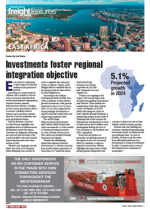In a bid to foster a greener and more sustainable future, the East African Community (EAC) is set to transform its energy landscape. By harnessing the power of wind, solar, and geothermal resources, the region aims to enhance energy efficiency and reduce reliance on fossil fuels.According to a spokesman for the EAC, the organisation’s partner states have already embarked on various initiatives to tap into the potential of renewable energy and energy conservation. These include reviews of national renewable energy laws, implementation of energy management regulations, national strategies and standards for energy efficiency and renewable energy, and promotion of energy efficiency and conservation.During a recent ministerial session of the EAC sectoral council of energy held in Tanzania, delegates heard that investments in wind and solar energy infrastructure were under way. These range from mini-solar grids in Burundi to large-scale wind and solar projects in Kenya. The meeting heard that Rwanda and Tanzania had also increased their investment in solar energy projects, while Uganda was looking at solar solutions.There is recognition across East Africa that it needs to not only modernise its energy systems but also expand electrical services significantly if it is to achieve its economic and social goals. Much has been achieved with USAID’s East Africa Energy Programme, which has been aimed at expanding affordable and reliable electricity services in East Africa, thus advancing economic growth and security.Despite its move to increase the use of solar and wind, ongoing investment in fossil can be expected. This includes the progress at Kenya’s commercial oil discovery in the South Lokichar basin, which has an estimated 2.9 billion barrels and a recoverable estimate of 585 million barrels. Tanzania is also continuing to establish itself as a leading oil and gas player in the region, with oil and gas exploration taking place both onshore and offshore. Uganda has made significant progress in the construction of the East African Crude Oil Pipeline (EACOP) Project, with the installation of pipes on the ground scheduled to start in May this year. Rwanda is also investing in the utilisation of methane gas for electricity generation.“Energy plays a critical role in industrial development and investment promotion, and therefore access to reliable, safe and cost-effective energy is not optional but compulsory if our region is to realise its development objectives,” said Shaib Hassan Kaduara, the minister of water, energy and minerals, Zanzibar and Tanzania.EAC deputy secretary general in charge of customs, trade and monetary affairs, Annette Ssemuwemba, said that the EAC had rich energy resources but most remained untapped.“As a region, we must therefore focus on sufficient, reliable and cost-effective energy to meet our development needs.”

